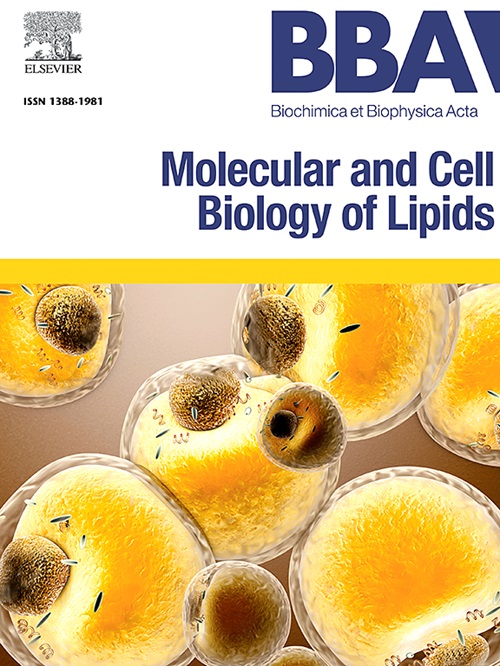Loss of the acyltransferase TMEM68 leads to growth delay and dysregulation of triacylglycerol and glycerophospholipid homeostasis in the mouse brain
IF 3.3
2区 生物学
Q2 BIOCHEMISTRY & MOLECULAR BIOLOGY
Biochimica et biophysica acta. Molecular and cell biology of lipids
Pub Date : 2025-05-06
DOI:10.1016/j.bbalip.2025.159622
引用次数: 0
Abstract
Lipid droplets (LDs) are ubiquitous cellular storage organelles for triacylglycerol (TAG) that have recently been implicated in brain development and aging, and the progression of neurodegenerative diseases. However, the enzymes responsible for brain TAG synthesis are incompletely understood. Transmembrane protein 68 (TMEM68) catalyzes TAG synthesis independent of canonical diacylglycerol acyltransferase (DGAT) enzymes and is highly expressed in the brain. In the current study, we addressed the role of TMEM68 in murine brain TAG metabolism using a global Tmem68 knockout mouse model. We found that loss of TMEM68 led to decreased TAG levels in the cerebral cortex and a concomitant increase in polyunsaturated glycerophospholipid species. These changes in lipid pattern were associated with perturbed expression of genes involved in fatty acid and glycerophospholipid metabolism. While brain size and morphology were largely unaffected, TMEM68 deficiency caused reductions in white adipose tissue mass, decreased insulin-like growth factor 1 levels, and retarded weight gain. In conclusion, our study identifies TMEM68 as regulator of TAG and glycerophospholipid homeostasis in the central nervous system and discloses a requirement of the enzyme for postnatal development and energy metabolism.
酰基转移酶TMEM68的缺失导致小鼠大脑中生长延迟和三酰甘油和甘油磷脂稳态失调
脂滴(ld)是普遍存在的三酰基甘油(TAG)的细胞储存细胞器,最近被认为与大脑发育和衰老以及神经退行性疾病的进展有关。然而,负责脑TAG合成的酶尚不完全清楚。跨膜蛋白68 (TMEM68)独立于典型二酰基甘油酰基转移酶(DGAT)酶催化TAG合成,并在大脑中高度表达。在目前的研究中,我们利用TMEM68敲除小鼠模型研究了TMEM68在小鼠脑TAG代谢中的作用。我们发现TMEM68的缺失导致大脑皮层TAG水平下降,并伴随多不饱和甘油磷脂种类的增加。脂质模式的这些变化与参与脂肪酸和甘油磷脂代谢的基因表达紊乱有关。虽然大脑大小和形态在很大程度上没有受到影响,但TMEM68缺陷导致白色脂肪组织质量减少,胰岛素样生长因子1水平降低,体重增加迟缓。总之,我们的研究确定了TMEM68是中枢神经系统TAG和甘油磷脂稳态的调节剂,并揭示了该酶在出生后发育和能量代谢中的需求。
本文章由计算机程序翻译,如有差异,请以英文原文为准。
求助全文
约1分钟内获得全文
求助全文
来源期刊
CiteScore
11.00
自引率
2.10%
发文量
109
审稿时长
53 days
期刊介绍:
BBA Molecular and Cell Biology of Lipids publishes papers on original research dealing with novel aspects of molecular genetics related to the lipidome, the biosynthesis of lipids, the role of lipids in cells and whole organisms, the regulation of lipid metabolism and function, and lipidomics in all organisms. Manuscripts should significantly advance the understanding of the molecular mechanisms underlying biological processes in which lipids are involved. Papers detailing novel methodology must report significant biochemical, molecular, or functional insight in the area of lipids.

 求助内容:
求助内容: 应助结果提醒方式:
应助结果提醒方式:


